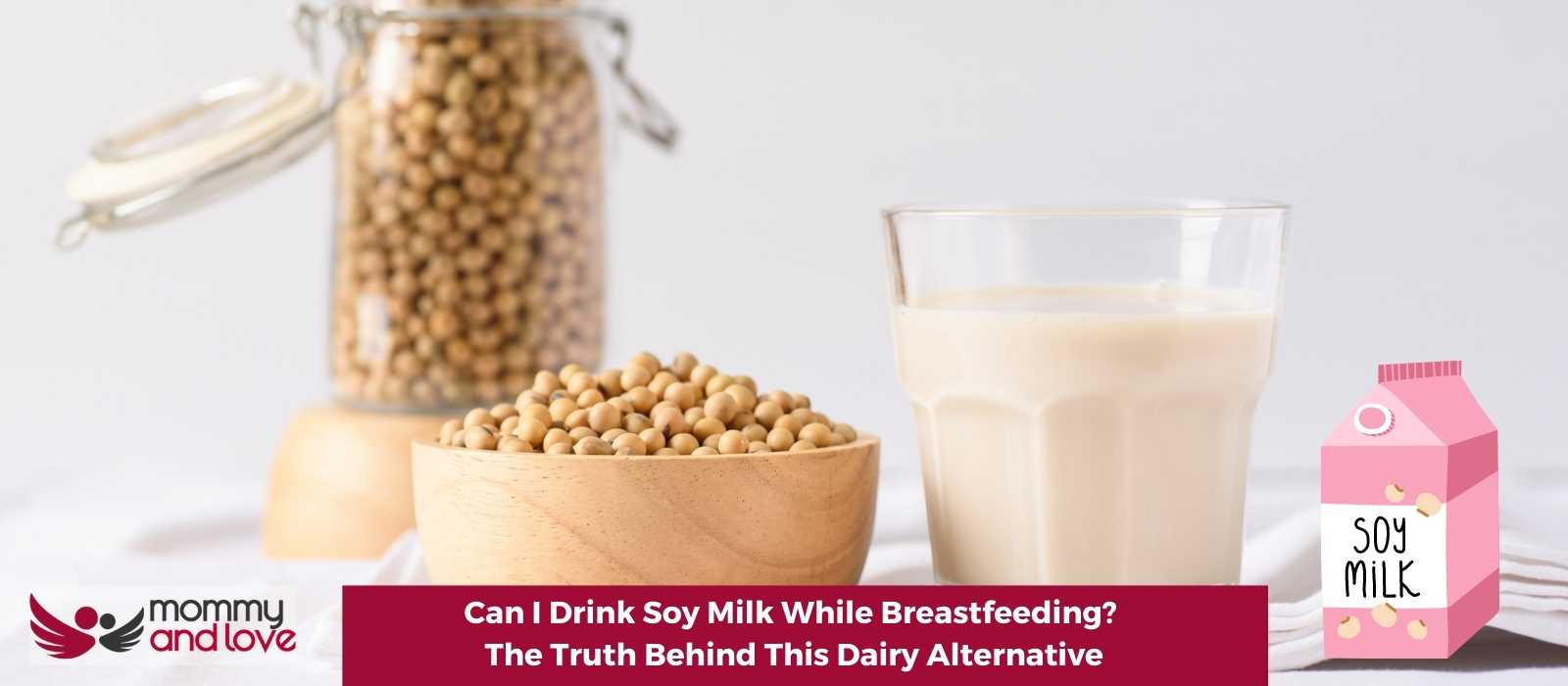Soy milk is a popular choice for people who are looking for a dairy-free or vegan beverage.
In this blog post, we will discuss the benefits and health concerns of soy milk for breastfeeding moms.
Can Breastfeeding Mothers Have Soy Milk?

The answer is yes, you can! Soy milk brings many health benefits.
It is a good source of soy protein and other nutrients which makes it a great choice for breast feeding moms, especially those who are allergic to cow’s milk protein but want to have proper nutrition.
Just make sure to choose soy products that are fortified with vitamins such as calcium and vitamin D, as these beneficial nutrients are important for both moms and babies.
It is also an excellent source of two minerals that are important for red blood cell formation: iron and copper. This will be beneficial for the healthy development of babies who are growing quickly.
Aside from that, it also contains omega-3 fatty acids which are essential to the rapid brain development of infants.
What Are the Health Concerns About Drinking Soy Milk While Breastfeeding?
There are a few health concerns that come along with consuming soy milk while breast feeding.
Phytic Acid Content
One is the phytic acid content. Aside from soy protein, soy foods and drinks contain high levels of this acid, which can inhibit the absorption of minerals like zinc and calcium.
This can be a concern for pregnant women and breast feeding moms since they need these minerals to produce breastmilk.
Isoflavones
Another concern is the soy isoflavones. Isoflavones are a type of phytoestrogen, which is a plant-based estrogen. Some animal studies have shown that soy isoflavones can interfere with the absorption of thyroid hormones, breast cancer and increased body weight.
This could be a problem for breast feeding moms since a low thyroid hormone level can impact breastmilk production. And in the case of those who are pregnant, it was shown to cause negative effects such as giving birth to infants with birth defects.
Allergic Reaction

Finally, there is always the risk of an allergic reaction.
Soy is a common allergen, so breast feeding moms who drink and eat soy-based products may experience negative reactions, especially to its protein. While it is important to get proper nutrition, there are plenty of alternative sources.
Common signs and symptoms of a soy protein allergy on the human body can include skin rashes, vomiting, and diarrhea.
If you have soy allergies, it’s better to stay away from soy products and anything that belongs to this food group. You can get your nutritional needs from alternative source. Despite its many benefits, the adverse effects can be too much.
How Much Soy Milk Can a Nursing Mother Drink While Breastfeeding?
There is no definitive answer to this question, as every woman and every baby is different. However, most lactation consultants agree that many women can drink up to two cups of soy-based milk per day (or foods that contain soy protein) without adversely affecting their breastfeeding relationship with their baby.
It is important to note that this milk should not be used as a replacement for a mother’s milk, but rather as an addition to the nursing moms diet. And even if you don’t have allergies to these foods, you should still avoid consuming them in large quantities.
You can add soy protein to your diet by eating certain foods such as beans, protein powders, tempeh and tofu.
Can Soy Milk Increase Breast Milk Supply?
There is some evidence that soy milk can help increase breastmilk supply. One study found that women who drank two cups of this milk per day had a 26% increase in breast milk.
However, other studies have found no significant difference in breast milk between women who drink soy-based milk and those who don’t.
So, if you’re looking for a way to boost your breast milk production, this milk may be worth a try. But remember that not all women will see a difference, so it’s important to track your own production and see if there is an increase.
Can Soy Milk Hurt a Baby?
This is a question that many parents may ask, as soy milk is a popular dairy alternative. The good news is that the soy protein in this milk does not usually cause allergic reactions in babies.
Some infants who are sensitive to the protein in cow’s milk may also be allergic to this milk. If your baby has a cow’s milk allergy, your pediatrician will likely recommend that you avoid giving your baby soy milk as well.
If you are breastfeeding your infant, it is important to note that some of the protein in this milk can pass through breastmilk and cause an allergic reaction in your baby.
If you are going to drink this milk, it is best to do so after you have finished breastfeeding your infant for the day and should not be in large amounts.
Also, soy formula is not a substitute for breastfeeding your child. Aside from allergies, it could also cause digestive system problems.
What Milk Is Best for Breastfeeding Moms?

There are many different types of milk that can be consumed to increase breastmilk production. Some of the most popular include cow’s milk and goat’s milk.
Each type of milk has its own unique properties that can help boost breastmilk production.
Cow’s milk is a great source of calcium, which is essential for healthy breastmilk production. Goat’s milk contains high levels of vitamin A and vitamin C, both of which are important for lactation.
Which type of milk is best for you will depend on your own individual preferences and needs. Try out a few different types and see which one works best for you and your child.
Regardless of the type of milk you choose, make sure to drink plenty of water as well to help increase breastmilk production.
Conclusion on Drinking Soy Milk When Nursing
Soy milk is popular that many breastfeeding moms turn to in order to increase their breast milk.
While it does have some benefits, there are also some potential risks associated with drinking it while breastfeeding or even during pregnancy.
Consider the risk before you consume or eat anything soy-based because these food and drinks contain iron, proteins, acids and minerals that are considered both good and bad. They have been linked to cancer, weight gain and bad nutrition.
It is important for nursing mothers to weigh the pros and cons before making a decision about whether or not to include it in their healthy diet. If consuming soy proteins and cow’s milk gives you allergies, avoid soy milk and consider almond milk instead.

This article was written by Sandra Baker – full time writer and the mother of four amazing kids (including twins!)
She’s also a breastfeeding counselor and has spent years helping new parents learn how to care for their children. When she’s not writing or caring for her children, Sandra likes to spend time reading and taking walks with her husband.




